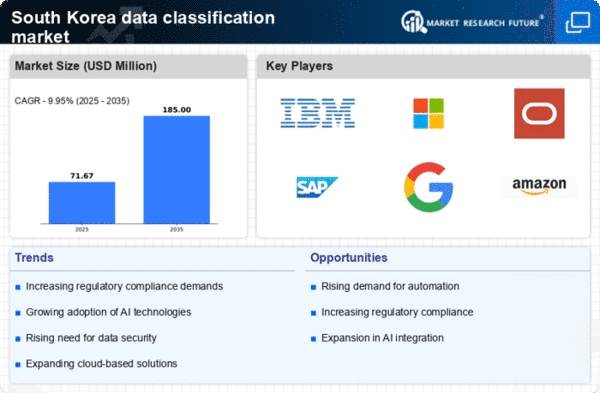Rising Data Privacy Concerns
In South Korea, the increasing emphasis on data privacy is a pivotal driver for the data classification market. With the implementation of stringent regulations such as the Personal Information Protection Act (PIPA), organizations are compelled to classify and manage data meticulously. This regulatory landscape necessitates robust data classification solutions to ensure compliance and mitigate risks associated with data breaches. The data classification market is projected to grow as businesses invest in technologies that enhance data governance and security. As of 2025, the market is expected to witness a growth rate of approximately 15% annually, driven by the need for organizations to protect sensitive information and maintain consumer trust.
Escalating Cybersecurity Threats
The surge in cybersecurity threats in South Korea has catalyzed the demand for advanced data classification solutions. Organizations are increasingly recognizing that effective data classification is essential for identifying and protecting sensitive data from potential breaches. The data classification market is likely to expand as companies seek to implement comprehensive security measures. In 2025, it is estimated that cyberattacks could cost South Korean businesses upwards of $10 billion annually, underscoring the urgency for effective data management strategies. By classifying data accurately, organizations can prioritize their security efforts, thereby reducing vulnerabilities and enhancing their overall cybersecurity posture.
Growing Demand for Data-Driven Insights
In South Korea, the demand for data-driven insights is propelling the growth of the data classification market. Organizations are increasingly leveraging data analytics to gain competitive advantages, necessitating effective data classification to ensure that relevant information is accessible and actionable. The data classification market is likely to see a surge in investments as companies recognize the value of structured data in driving business strategies. By 2025, it is anticipated that the market will expand by 18%, as organizations prioritize data classification to enhance their analytical capabilities and foster innovation.
Increased Focus on Digital Transformation
The ongoing digital transformation across various sectors in South Korea is a significant driver for the data classification market. As organizations transition to digital platforms, the need for effective data management becomes paramount. The data classification market is expected to grow as businesses seek to implement solutions that facilitate seamless data integration and accessibility. In 2025, it is projected that the digital transformation initiatives will contribute to a market growth rate of approximately 17%. This shift underscores the importance of data classification in enabling organizations to harness the full potential of their data assets.
Technological Advancements in Data Management
Technological innovations are significantly influencing the data classification market in South Korea. The advent of machine learning and artificial intelligence is transforming how organizations classify and manage data. These technologies enable automated classification processes, which enhance efficiency and accuracy. The data classification market is expected to benefit from these advancements, as businesses increasingly adopt AI-driven solutions to streamline their data management practices. By 2025, the market is projected to grow by 20%, driven by the integration of advanced technologies that facilitate real-time data classification and improve decision-making capabilities.
















